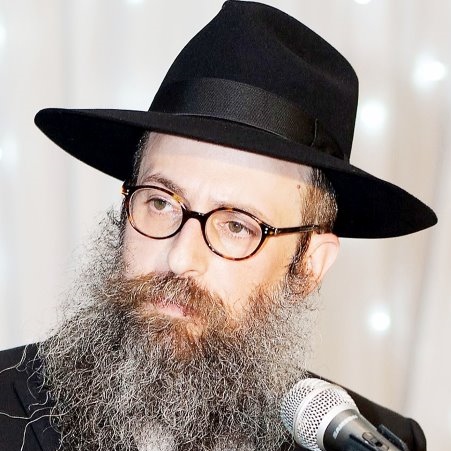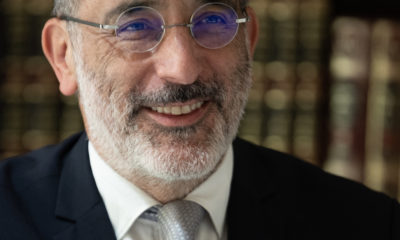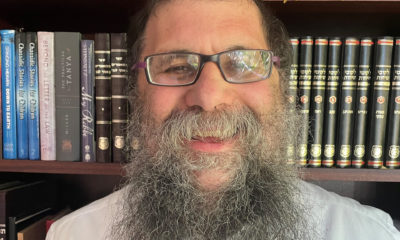
Religion

One people, one destiny
It was the lead-up to the 2010 Soccer World Cup, and I received an email from a university professor in the United States. He was bringing a group of students to South Africa on a learning trip, which was timed to coincide with the World Cup.
As he had a couple of Jewish students, he would like to be able to offer them a Shabbat meal, and he asked if I could assist. There was, however, a “catch”. He couldn’t split the group, and we would have to host the entire group, not just the Jewish students. Naturally, neither request was any issue at all, and I told him that our family would be honoured to host them.
It was a wonderful and uplifting Shabbat meal. (I hope they felt the same.) A few weeks later, I received an email from one of the students, thanking us for our hospitality. He then he went on to describe the sheer amazement of his non-Jewish friends. Here was a group of total strangers, from different countries, clearly different religious practices, yet we opened our home to these Jewish students and their non-Jewish friends. They were amazed at how being Jewish simply opens doors. It was nice to hear, but in truth, that’s what it means to be Jewish – we’re one people, one family, brothers and sisters all.
It’s one of the highlights of the seder – besides the meal that is. The song, Dayenu, gets all participants involved, young or old. It’s a song which goes step by step through the various miracles Hashem performed, from the plagues to bringing us to the holy land. At the end of each event, we say “dayenu” (it would have been sufficient).
There seems to be one stanza which is difficult to comprehend – if G-d would have brought us to Mount Sinai and not given us the Torah, dayenu, that would have been sufficient. Ignoring the fact that the giving of the Torah was the most seminal event in the history of civilisation as we know it; ignoring the centrality of the Torah to the very definition of us as a people; and even ignoring the fact that the purpose of the exodus was to receive the Torah, what would have been the point of being brought to an arid and desolate desert? In what way would the exodus from Egypt culminating in being in the Sinai desert have been dayenu (sufficient)? It seems it would have been pointless, let alone not sufficient.
We’re all aware that the moments prior to the actual receiving of the Torah were in and of themselves historic in nature. “Vayichan sham Yisrael” (and Yisrael encamped there), at the foot of Mount Sinai. The pre-eminent commentator, Rashi, notes the singular expression of “vayichan”, which translate as “and he encamped”, he being singular. Rashi, citing the Mechilta, states that on this occasion, the Jewish people, all three million of them, were encamped in unity “like one person with one heart”.
Paying tribute to this monumental occasion, the unity of the Jewish people, we say in the haggadah that had Hashem brought us to that moment of unity and had nothing subsequent occurred, it would have been dayenu (sufficient).
The theme of unity is a central one throughout the haggadah. We commence the proceedings by inviting anyone who has no place to go for the seder to join us at our table. How can we celebrate freedom and liberation while knowing that there are people with nowhere to go? So, we start by making what is in many ways a symbolic declaration, inviting anyone to join us.
This opening salvo of unity is found later on when we read about the ubiquitous four sons, one of the other central parts of the haggadah. As we know, it speaks of the entire spectrum of sons sitting around the seder table, from the wise son to the son who is so far off the religious “beaten track” that even the author of the haggadah calls him a rasha (wicked son). Quite a title!
There’s a word which appears before describing each of the sons. The word is “echad” (one). One is wise, one is wicked, and so on. Grammatically, the term is redundant, its omission would in no way compromise the prose or our understanding of the content.
I would like to suggest that in putting in the word “echad”, the author of the haggadah is once again reflecting the importance of “echad”, of unity, on the night of Pesach. Indeed, there are four sons differing in the extreme from one another. Yet, in spite of those differences, they are all sitting together, in harmony, around the same table, celebrating the same festival of Pesach. Once again, it’s a vivid reflection of the critical unity at the heart of Pesach, at the heart of the exodus, and indeed at the heart of the Torah and Jewish identity.
We’re living in “interesting” times with great challenges. At home, in Israel, the discord and rift is certainly worse than I can ever recall. Different views, different perspectives, different politics, are all creating a schism in society, the likes of which hasn’t been seen before. Though in the past, threats from the outside have forced peace on the inside, on this occasion, even with external threats, our people seem divided like never before.
Come Pesach, the seder, and the haggadah, and we’re reminded of the importance of unity. Not a unity that’s predicated on shared perspectives, not a unity predicated on shared views, or shared politics, not even a unity predicated on shared religious practice.
Rather, a unity predicated on a shared history, a shared destiny, and a shared future, in spite of our differences. The seder night calls on Jews the world over to remember that in spite of all our differences, we’re one people, and Pesach is the time to remember and celebrate that unique reality.
- Rabbi Gidon Fox is the rabbi of the Pretoria Hebrew Congregation and a dayan on the Johannesburg Beth Din.










